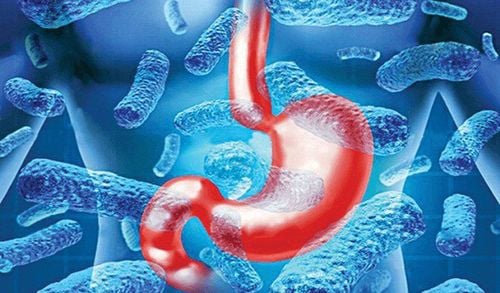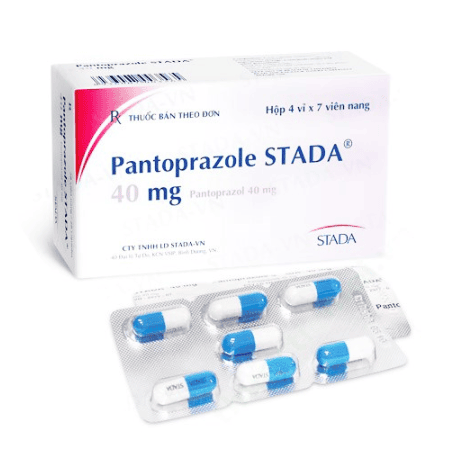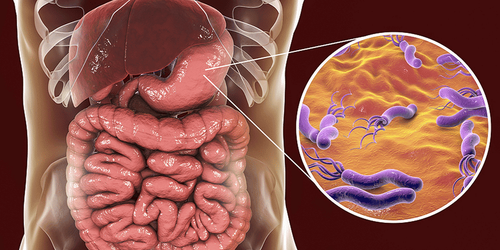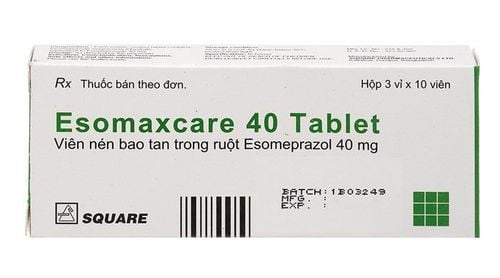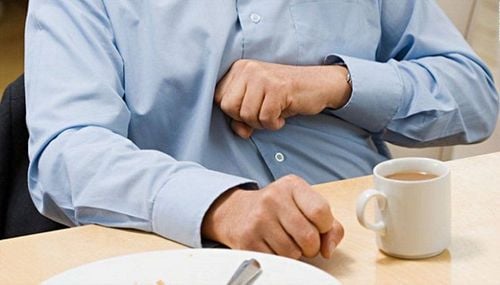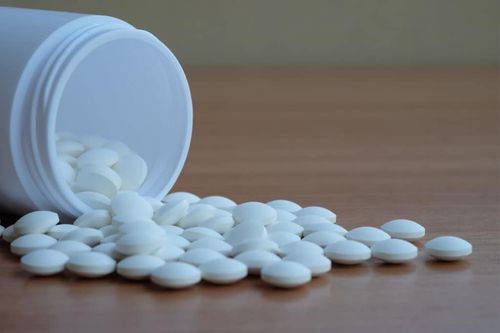This is an automatically translated article.
Helicobacter pylori in the stomach is one of the factors that increase the risk of stomach cancer. Worried about unpredictable complications when infected with HP, many people abuse tests and treatment to kill HP bacteria. So, should we perform HP eradication completely, when should HP treatment be carried out?
1. What are the characteristics of Helicobacter pylori in the stomach?
Helicobacter pylori (full name: Helicobacter Pylori) has a rod shape with many spiral cilia, which grow inside the lining of the stomach. Helicobacter pylori survives by secreting the enzyme urease, which neutralizes acid in the stomach.
When they exist in the stomach, they can cause stomach pain with many manifestations such as: Pain and burning in the epigastric region, indigestion, flatulence, heartburn, bowel disorders, ... HP bacteria also transmission and re-infection is very high. It is mainly transmitted from person to person by mouth-to-mouth and by fecal transmission.
When invading the body, H. pylori bacteria in the stomach can cause diseases such as:
Acute gastritis: Patients often have no symptoms, a few have anorexia, fullness and sadness. vomit. On endoscopy, part or all of the gastric mucosa is found to be inflamed; Chronic gastritis: The result of a long-lasting acute inflammation of the stomach lining. Patients may develop atrophic inflammation in the antrum of the stomach, causing increased or normal gastric acid secretion, leading to duodenal ulcer. Or the patient may have atrophic gastritis spreading to the body, even atrophy of the entire gastric mucosa, causing ulcers and stomach cancer; Functional dyspepsia: Patients infected with HP have symptoms of pain or burning in the epigastrium, eating quickly, fullness, bloating,... These symptoms are usually relieved after eating about 30 minutes - 2 hours; Gastric - duodenal ulcer: Common in people over 40 years old, ulcer size is over 0.5cm, mainly ulcers in the small curvature, especially at the junction between the body and antrum. Stomach ulcers between the ages of 20 and 50 usually occur in the first part of the duodenum. Patients may experience complications of repeated bleeding or perforation of the stomach - duodenum; Gastric cancer: Helicobacter pylori in the stomach causes chronic inflammation of the gastric mucosa, reduction or loss of normal gastric glands, atrophic inflammation and intestinal metaplasia. Some cases of HP infection develop into stomach cancer; Gastric mucosa B lymphoma: A disease originating from the gastric mucosal epithelium, often with the presence of H.
2. How to detect HP bacteria in the stomach
Helicobacter pylori in the stomach can be detected by the following tests:
Through gastroscopy: Biopsy for HP bacteria, rapid urease test, pathology test for HP bacteria; No need for gastroscopy: C13, C14 breath test, fecal HP bacteria antigen test, serum IgG antibody test. The World Gastroenterology Organization recommends in practice to examine and treat HP using 2 methods: rapid urease test, C13, C14 breath test and fecal HP bacteria antigen test (or performed in children). ). Other methods are mainly carried out for the purpose of epidemiological research or in-depth research.
3. Is it necessary to treat H. pylori infection in the stomach?
3.1 Helicobacter pylori infection - how dangerous is it? In fact, most people over the age of 50 have HP bacteria, this condition is also relatively common in young people. On the other hand, only some strains of HP are capable of causing stomach cancer. Therefore, the researchers think that it is necessary to consider this type of bacteria under two aspects of benefit and harm and when to conduct treatment is also based on these two aspects.
According to many studies, up to 80% of people infected with HP do not have stomach pain. This type of bacteria is only harmful when they cause stomach disease. For those who do not have this disease, it has some advantages. Specifically, when treating HP, it will increase the level of the hormone renin, which stimulates appetite, causing unwanted weight gain (because the patient feels much more appetite than before). Besides, for diabetes and bronchial asthma, many studies also show that the group of people infected with HP have less of these diseases than the group of people without HP infection.
3.2 In what cases should HP bacteria be treated? To answer the question of when to treat Helicobacter pylori in the stomach, it is necessary to consider clinical facts. Currently, the medical community agrees that HP bacteria should only be treated in the following cases:
Gastric ulcers - duodenal ulcers caused by HP bacteria make the lining of the stomach thin, ulcers develop stronger; Having functional dyspepsia ; Unexplained thrombocytopenia bleeding; There is a tumor in the stomach: Hyperplastic polyp, adenoma, mucosal resection,...; Early gastric cancer that has been endoscopically resected or dissected the gastric mucosa; Late stage stomach cancer, have undergone surgery; Family history (parents, siblings) of stomach cancer; Atrophic inflammation of the gastric mucosa; Gastroesophageal reflux - esophagus for a long time; Unexplained vitamin B12 or iron deficiency; Working in an environment with a high risk of stomach cancer such as coal mining, lead,... 3.3 Precautions when treating H. pylori infection in the stomach In some countries like Japan, the treatment attitude is Every case of HP is the treatment of eradication, because Japan has a very high rate of stomach cancer, the rate of HP infection is about 51% of the population. In contrast, in some regions such as Alaska of the US, Greenland of Denmark, some areas in Canada and Russia,... where the prevalence of HP infection accounts for over 60% of the population, and the age of infection is similar to Vietnam (starting at the beginning of the year). HP infection in children 4-5 years old, this rate increases rapidly until the age of 15), does not advocate eradicating HP. Experts here recommend not killing HP for everyone, including those with symptoms such as indigestion, epigastric pain, fast eating, fullness after eating,...
In the indications for treatment Treatment of HP eradication in our country also has many issues to consider and be cautious about. Specifically:
The rate of HP infection in Vietnam accounts for over 70% of the population, the recurrence rate is very high. On average 11 months after killing, HP reappeared in the stomach with the rate of about 23.5%; The rate of HP antibiotic resistance in Vietnam is very high: Amoxicillin 24.9%, Metronidazole 69.4% (researched 95.5%), Clarithromycin 34.1% (researched 85.5%), Levofloxacin 27.9%, Tetracycline 17.9%, and resistance to many antibiotics is 47.4%. Thus, the treatment of HP becomes more and more difficult, should be carefully considered and properly indicated, should not be abused. According to Korean recommendations, HP testing and treatment is not indicated in the first place, but only testing and eradicating HP when other methods fail.
From the above information, not all cases of H. pylori infection in the stomach can cause cancer and this bacteria is not completely harmful to the body. Therefore, when wanting to know when to treat specific HP bacteria, the patient should go to a specialized hospital for an accurate diagnosis and examination by a doctor. So can HP bacteria be cured? This bacteria can be completely cured if the patient adheres to the treatment regimen and leads a healthy lifestyle.
Follow Vinmec International General Hospital website to get more health, nutrition and beauty information to protect the health of yourself and your loved ones in your family.
Please dial HOTLINE for more information or register for an appointment HERE. Download MyVinmec app to make appointments faster and to manage your bookings easily.




